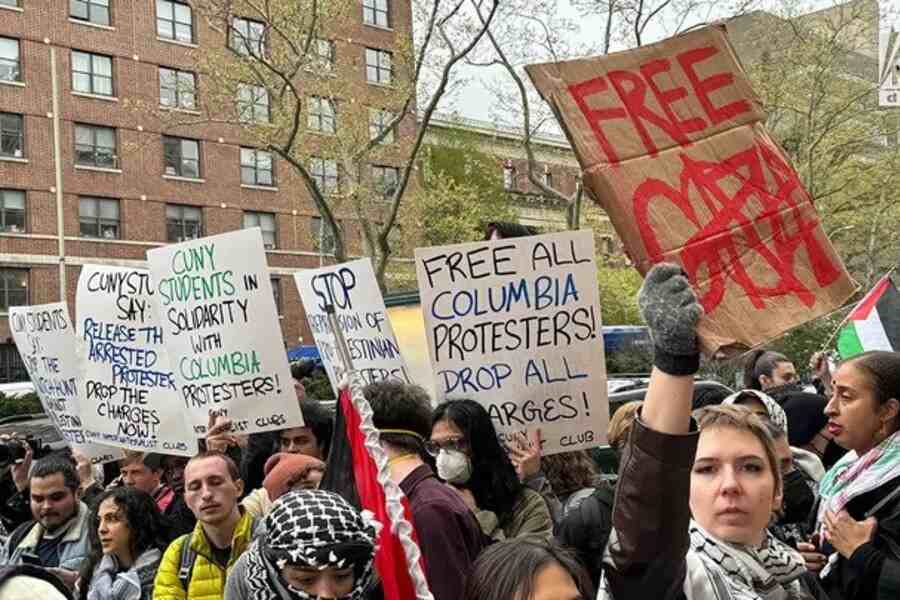
In a pivotal legal development, a second-year Jewish student at Columbia University has initiated a class action lawsuit against the prestigious institution, alleging a significant breach of its duty to ensure a safe and inclusive environment for all students.
This lawsuit, filed on Monday in federal court, casts a glaring spotlight on the persistent harassment and intimidation experienced by Jewish students on campus, underscoring broader concerns about campus safety and the protection of minority groups.
The plaintiff, whose identity remains undisclosed for safety reasons, has taken a bold stand against what they perceive as a failure on the part of Columbia University to uphold its commitment to fostering a campus environment free from discrimination and hostility.
Spearheaded by attorney Jay Edelson, the lawsuit asserts that the university has woefully neglected its responsibility to enforce policies aimed at safeguarding students from violence and harassment, particularly in the context of contentious political debates surrounding Israel and Palestine.
Central to the lawsuit’s allegations is the contention that while peaceful protest is a cornerstone of democratic society, certain factions within these demonstrations have crossed a dangerous threshold, resorting to vitriolic rhetoric and intimidation tactics targeting Jewish individuals.
The Gaza Solidarity Encampment, established on April 18, emerges as a focal point of contention, serving as a breeding ground for relentless harassment directed at Jewish students, including physical assault, verbal abuse, and obstruction of their access to campus facilities.
The lawsuit paints a distressing portrait of Jewish students grappling with feelings of marginalization and insecurity within their academic community. Instances of being spat on, shoved, and subjected to derogatory slurs underscore the pervasive climate of fear and hostility that has permeated campus life. Moreover, the encampment’s continued presence exacerbates tensions, creating an environment where Jewish students feel increasingly isolated and vulnerable.
Columbia University’s response to these troubling developments, as outlined in the lawsuit, has been characterized by inadequacy and indifference. Allegations of administrative inaction and a lack of meaningful disciplinary measures against perpetrators of harassment underscore a systemic failure to address the root causes of campus unrest.
President Minouche Shafik’s purported prioritization of negotiations with encampment protesters over the safety and well-being of Jewish students further compounds the sense of betrayal felt by the plaintiff and their peers.
In an attempt to mitigate safety concerns, the university implemented a hybrid learning model, offering students the option to attend classes virtually if they felt unsafe on campus. However, the lawsuit argues that this solution falls short of addressing the underlying issues at hand, effectively segregating Jewish students and depriving them of a meaningful educational experience.
The decision to pivot to online learning not only exacerbates feelings of isolation and exclusion but also perpetuates a climate of fear and uncertainty among the student body.
Beyond the immediate implications for campus safety, the lawsuit underscores broader concerns about the prevalence of antisemitism and discrimination within academic institutions. By failing to confront and address instances of harassment and intimidation head-on, Columbia University risks perpetuating a culture of intolerance and hostility that undermines its purported commitment to diversity, equity, and inclusion.
Looking ahead, the lawsuit seeks immediate injunctive relief to address the safety concerns of Jewish students on campus. Additionally, punitive damages are sought as a means of holding the university accountable for its failure to fulfill its contractual obligations to provide a safe and inclusive learning environment for all students.
As the legal battle unfolds, the Columbia University community is confronted with a sobering reckoning about the enduring legacy of discrimination and the imperative of ensuring the safety and well-being of all students, regardless of their background or beliefs.
The outcome of this lawsuit carries profound implications for the future of campus discourse and the protection of vulnerable student populations, underscoring the urgency of addressing systemic issues of discrimination and intolerance within academic institutions.








